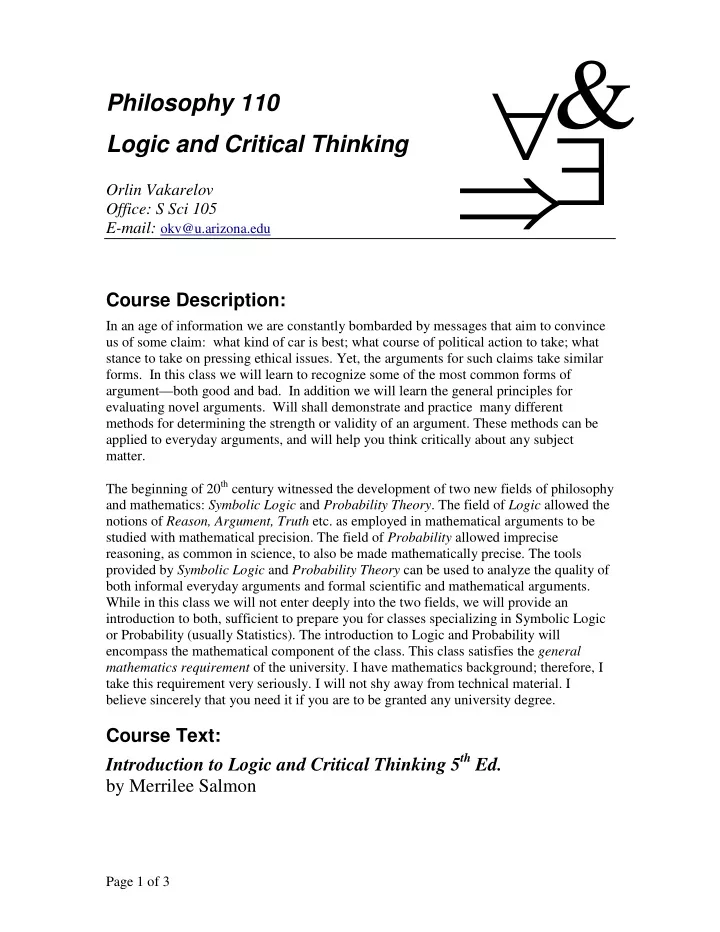

∀ & Philosophy 110 ∃ ⇒ Logic and Critical Thinking Orlin Vakarelov Office: S Sci 105 E-mail: okv@u.arizona.edu Course Description: In an age of information we are constantly bombarded by messages that aim to convince us of some claim: what kind of car is best; what course of political action to take; what stance to take on pressing ethical issues. Yet, the arguments for such claims take similar forms. In this class we will learn to recognize some of the most common forms of argument—both good and bad. In addition we will learn the general principles for evaluating novel arguments. Will shall demonstrate and practice many different methods for determining the strength or validity of an argument. These methods can be applied to everyday arguments, and will help you think critically about any subject matter. The beginning of 20 th century witnessed the development of two new fields of philosophy and mathematics: Symbolic Logic and Probability Theory . The field of Logic allowed the notions of Reason, Argument, Truth etc. as employed in mathematical arguments to be studied with mathematical precision. The field of Probability allowed imprecise reasoning, as common in science, to also be made mathematically precise. The tools provided by Symbolic Logic and Probability Theory can be used to analyze the quality of both informal everyday arguments and formal scientific and mathematical arguments. While in this class we will not enter deeply into the two fields, we will provide an introduction to both, sufficient to prepare you for classes specializing in Symbolic Logic or Probability (usually Statistics). The introduction to Logic and Probability will encompass the mathematical component of the class. This class satisfies the general mathematics requirement of the university. I have mathematics background; therefore, I take this requirement very seriously. I will not shy away from technical material. I believe sincerely that you need it if you are to be granted any university degree. Course Text: Introduction to Logic and Critical Thinking 5 th Ed. by Merrilee Salmon Page 1 of 3
Phil 110: Logic and Critical Thinking Course Administration The class meets twice a week. Office hours will be held for three hours a week. Course Requirements You are required to attend the classes, and you are required to do the assigned daily readings. I will ask random student questions that are part of the assigned readings, even if we have not covered the material in class. The grade partition of the class will be as follows: 1. Three Assignments (10% each): The assignments will consist of exercises similar to the ones in the book. One of the three will be dedicated exclusively to Logic and Probability; i.e. it will be more mathematical in form. You will have two weeks to complete each assignment. 2. Midterm examination (25%) : The format will be a combination of short answer and multiple choice exercises. 3. Written assignment (20%) : The written assignment will be a critical analysis of an argument in a supplied text. Your task will be to characterize and evaluate only the argument. You are NOT to evaluate the topic of the argument. In other words, you are not to write a critical paper on the topic. I will dedicate a whole class discussion to the written assignment. The text and more detailed instructions will be supplied after the discussion. 4. Final Examination (25%) : It will be similar to the midterm, only longer. The final WILL include material from the entire semester, but it will favor proportionally material after the midterm. Tentative schedule: Class 1 Introduction Class 2 Chapter 1: Introduction to arguments Class 4 Chapter 2: Paying special attention to the language of arguments Class 6 Chapter 3: Deductive arguments, Inductive arguments and Fallacies Assignment 1 posted Page 2 of 3
Phil 110: Logic and Critical Thinking Class 9 Chapter 4: A closer look at Inductive Arguments Class 10 Assignment 1 Due in class Class 12 Chapter 5: Causal arguments Class 14 Midterm examination Assignment 2 posted Class 15 Written assignment posted Writing tutorial and assignment explanation Class 16 Chapter 6: Probabilities and Inductive Logic Class 18 Assignment 2 Due in class Class 20 Chapters 8: Deductive Reasoning and Sentential Logic Class 24 Chapter 9: Categorical Syllogisms Assignment 3 posted Class 28 Chapter 10: Arguments in which Validity depends on Relationships Assignment 3 Due in class Class 30 Review for the exam Written assignment due in class Exam Final examination Page 3 of 3
Recommend
More recommend